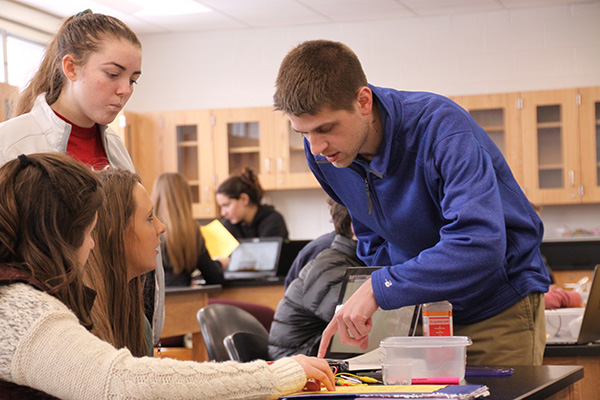Teachers implement unconventional classroom methods

Methods in Motion: Helping his students with a lab, Science Teacher Robert Cowhey explains the flow of electrical charge through a circuit. This year, Cowhey has not assigned any homework to his students, and he is one of several other teachers who have introduced unconventional teaching methods in their classes.
March 21, 2017
When imagining a typical high school course, homework, letter grades and points are common attributes of any class offered at South, but some teachers are beginning to stray from these norms. As new philosophies of learning continue to evolve, some South teachers are taking advantage of unconventional methods and are implementing them in their classes.
For many teachers, homework is a necessary extension of the material taught in class, but Science Teacher Robert Cowhey views homework differently. He says this is the first year he has not assigned homework, and test scores in his classes have remained consistent with past years. He also offers optional homework to those who need it for a further understanding of the class work.
“If you need to learn, [homework is] an opportunity to learn, but if you don’t need to do the work, then you don’t need to,” Cowhey said. “You learn [the material] in class and you go learn [about other subjects] at home, so I figured I’d try [the no-homework policy with my classes].”
According to junior Madelyn St. Clair, a student in Cowhey’s physics class, she values his approach to learning and the care he puts into his class.
“Mr. Cowhey’s class is completely different from any other class I’ve taken because of [his] teaching style,” St. Clair said. “He’s all about the process of learning instead of drilling these numbers in your head [to] remember them for the test. In my other classes, it’s just like, ‘Remember this knowledge so you can get an A on the test,’ […] but Cowhey is not like that [because] he cares about you knowing how to learn.”
In contrast, Libby Lupfer, social studies teacher, sees homework, such as notes, as an essential addition to class work. She also views notes as crucial preparation for future academics.
“[Notes] offer students a skill that hopefully they’ll continue to use in [AP classes], even though they’re not getting graded,” Lupfer said. “[…] Even if you might not reread [the notes] extensively, just the process of what happens in your brain when you read and write and take notes does help you remember what you need to know.”
English Teacher John Allen also implemented an unconventional aspect to his class; he focuses more on the quality of work rather than varying percentages. By making points associated with letter grades into overall standards-based levels, he deems A work to be a 95 percent, B work to be an 85 percent, and so on until a 55 percent is an F. Allen says the main reason behind this grading system is to help his students put more value in learning.
“I noticed that students, when we had the zero to one hundred [grading system], were very focused on a number rather than performance level,” Allen said. “Students had lost the focus on, ‘Well, what is all this grading about actually?’ It’s about trying to measure, in a very imperfect way, […] a student’s growth and a student’s performance level.”
One of Allen’s previous students, junior Alexandra Woo, says Allen’s grading scale initially surprised her, but she found some comfort as the year went on. She says Allen’s scale did not drastically change her grades, which ultimately alleviated some pressure.
“I think [Allen] succeeded [in focusing on learning rather than grades] to some extent by forcing us, basically, to kind of study a little harder, work a little harder [for ourselves],” Woo said. “[The grading system] just helped me dive deeper into what I was doing, […] it kind of opened doors for what else I could find either in a book or a writing assignment.”
According to Cowhey, no matter the method, he says he wants students to be able to leave South with knowledge that will help them in their futures.
“If you […] need to learn a task, do you know how to learn what works best for you, what questions are you going to ask yourself?” Cowhey said. “[If students are] asking great questions, problem solving, thinking critically to analyze a situation, […] then I just think we’d be doing a great thing for the kids that came through here.”


